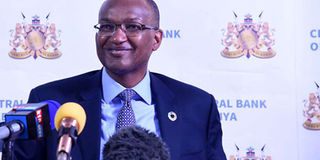Central Bank cuts key lending rate to boost credit access

Central Bank of Kenya Governor Patrick Njoroge briefing journalists after the Monetary Policy Committee meeting. CBK says credit to the private sector grew 6.6 per cent in the year to October. PHOTO | DIANA NGILA | NATION MEDIA GROUP
What you need to know:
- T-bill rates, which are influenced by the levels of government borrowing, look set to be the biggest determinant of loan rates, bankers say.
- CBK says scrapping of the interest rate cap had removed one of the concerns the Central Bank had about cutting the benchmark.
The Central Bank of Kenya (CBK) on Monday signalled commercial banks to cut their lending rates after it lowered its benchmark lending rate for the first time since May 2018 and weeks after the removal of the legal caps on borrowing charges.
CBK’s Monetary Policy Committee, sitting for the first time since Kenya lifted a cap on commercial interest rates on November 7, cut the CBR rate to 8.50 per cent from 9.0 per cent, saying the economy was operating below its potential.
The lowering of the rate is expected to signal banks to cut lending rates to boost supply of credit and put money in hands of consumers to increase demand for goods and services in corporate Kenya that is cutting jobs on lower sales.
PRICING
CBK says credit to the private sector grew 6.6 per cent in the year to October, compared to seven per cent in the 12 months to September — which are both below the ideal growth level of between 12 and 15 per cent.
“The committee noted the ongoing tightening of fiscal policy and concluded there was room for accommodative monetary policy to support economic activity,” said Dr Patrick Njoroge, the CBK Governor and chair of the committee.
Banks, which are yet to review the lending rates after the removal of the caps, can ignore the CBK signal to lower loan charges in an environment where the State is not controlling borrowing costs.
Mr Habil Olaka, the CEO of Kenya Bankers Association — the bankers lobby — reckons that lenders will consider other tools beyond the benchmark rate when pricing their loans, including government borrowing — which influences the cost of long term deposits that affect borrowing rates.
LOAN RATES
T-bill rates, which are influenced by the levels of government borrowing, look set to be the biggest determinant of loan rates, bankers say.
Dr Njoroge remained optimistic that the Treasury will reduce borrowing, allowing money to flow into the private sector at lower rates to stimulate the economy.
CBK says scrapping of the interest rate cap had removed one of the concerns the Central Bank had about cutting the benchmark.
High-risk borrowers like individuals and small businesses face an increase in loan rates of up to three percentage points following the removal of the legal cap on commercial lending charges, KCB chief executive Joshua Oigara said earlier.





